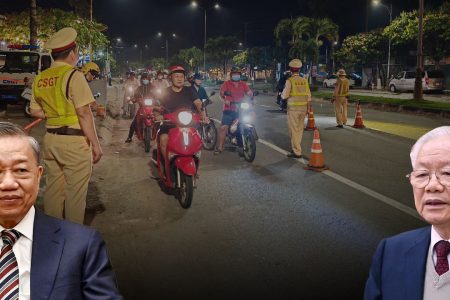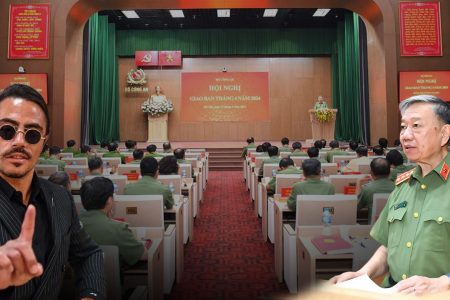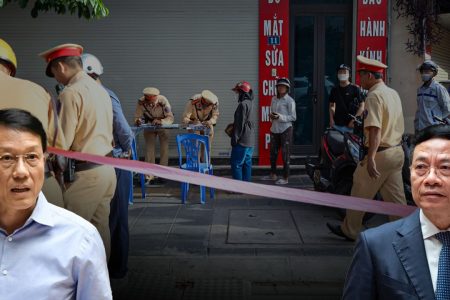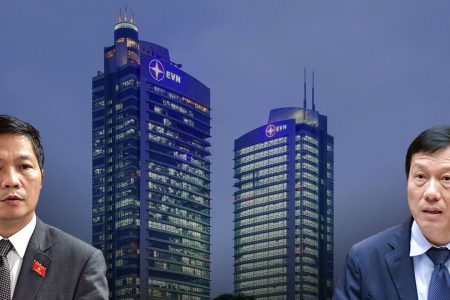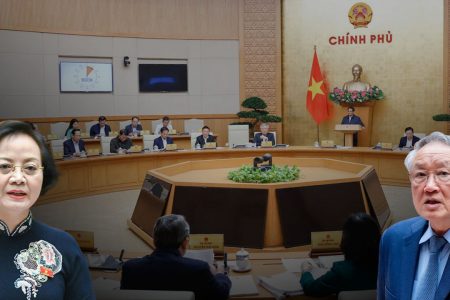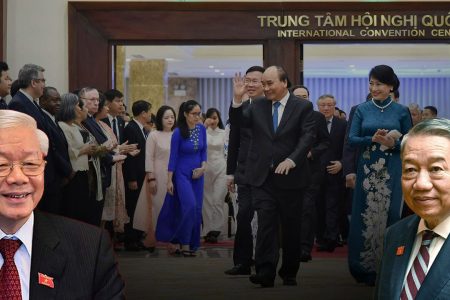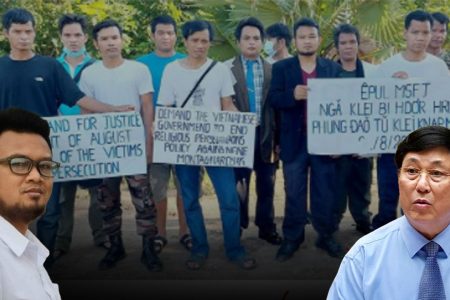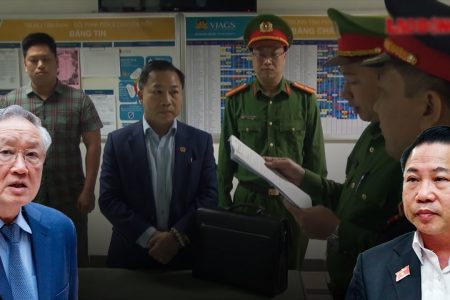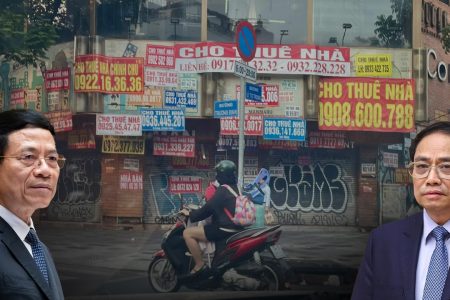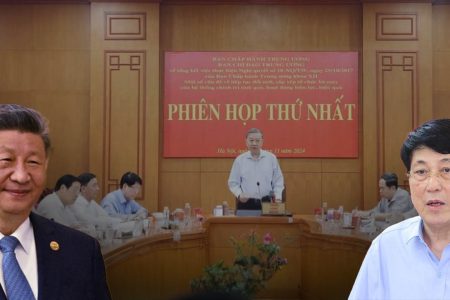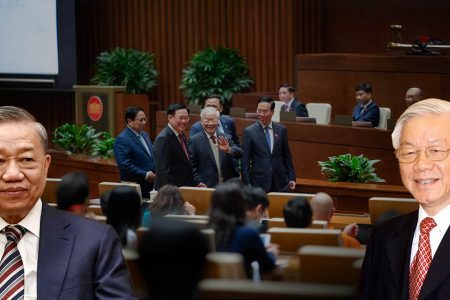
The Communist Party of Vietnam (CPV) is not as strong as we think. The Party is sick, even more, serious than leaders like General Secretary Nguyen Phu Trong or President Nguyen Xuan Phuc. The party has changed into a political party serving the interests of the clans and the crony capitalism of the ruling class… The socialist ideal that was the belief of party members is no longer there. The glue that sticks and unites internally is just power and money.
The party leadership group now only cares about power disputes, personnel arrangement, and the balance of interests of the faction, instead of paying attention to the issues of modernization, national renewal, and people’s livelihood. The Communist regime is facing many existential challenges.
1.– The country is still lagging
General Secretary Nguyen Phu Trong very proudly declared at the opening of the 12th Party Congress on January 26, 2021, that “Our country has never had the opportunity, potential, position and international prestige like this today.” Nguyen Phu Trong’s pride is not wrong if he compares his economic and political achievements with the tenure of his predecessors Ho Chi Minh, Le Duan, Truong Chinh, Do Muoi, Le Kha Phieu, and Nong Duc Manh. But compared to neighboring countries, how far has communist Vietnam actually developed?
Vietnam’s gross domestic product (GDP) in 2021 is just over $362.6 billion.
The World Development Index (WDI) was updated by the World Bank on July 1, 2022, showing that Vietnam’s per capita National Income (GNI) in 2021 is $3,560. Compared to other countries in the same region, Vietnam’s figure is only nearly one-eighteenth of Singapore’s, $64,010. Vietnam’s national income (GNI) per capita ranks 7th out of 11 Southeast Asian countries and 130th out of 195 countries statistically and ranked by the World Bank, according to data recently updated by this bank. at the beginning of July.
Brunei and Malaysia, respectively, ranked second and third in Southeast Asia with figures of $31,510 and $10,930, respectively, about 9 times and 3 times higher than Vietnam.
Three other ASEAN countries that stand above Vietnam are Thailand, with $7,260/person, ranking 88th in the world; Indonesia, with $4,140, 119th place; and the Philippines, with $3,640, placed at 128th. Countries in the same region with lower GNI per capita than Vietnam are Laos, Timor Leste, Cambodia, and Myanmar.
Vietnam’s GDP per capita is forecasted to reach $7,000-$7,500 by 2030, equivalent to Thailand’s GDP per capita in 2019, and has not caught up with Malaysia in 2010.
2.– Corruption is widespread.
Corruption and misappropriation of national assets are now a national problem. Dictatorship and corruption are the nature of dictatorial and one-party regimes, especially in communist countries like Vietnam and China. General Secretary Le Kha Phieu said: “Corruption in our country is caused by both the mechanism and the people.” The ruling class took advantage of their positions and powers for personal gain. Running for office and power are common forms of bribery and corruption.
Corruption is seen by party officials as the glue that holds factions together and motivates ambitious young cadres, of type 5c (descendants of the senior officials). Then State President Truong Tan Sang stated in an article dated September 2, 2014: “We still have to worry and feel heartache when we hear the long-standing word of mouth among the people: ‘First princelings, second- money, third- close relationships, fourth- wisdom” in cadre work.
Family relations become an agent in the recruitment and appointment of personnel at all levels.
In parallel with the socialist-oriented market economy, corruption in Vietnam is spreading all the time. The situation of corruption is still complicated in many fields, especially in land use management, construction investment from the State capital, banking credit, and personnel organization. The handling of corruption is still limited, and the recovery rate of corrupt and lost assets is still low.
Hundreds of corruption cases have caused thousands of billions of dollars in damage to the national budget, causing outrage in public opinion.
Public opinion criticized the corruption fighting as ineffective because the one-party system in Vietnam breeds corruption and corrupt people try to protect this mechanism. Therefore, entrusting the Communist Party with a monopoly on anti-corruption will increase corruption.
Nguyen Phu Trong came to power in 2011, promising to end the “ideological deterioration and curb corruption” because of concerns that the party and political system would be difficult to survive. At the 12th Congress, Trong mobilized to overthrow Nguyen Tan Dung and his notorious embezzlement clique. Power disputes within the party are always purposeful.
The composition of the party’s highest body, the 19-member Politburo, represents a balance of factional forces reflecting different interests. The Politburo is the political decision-making body of both the state and the party. Unlike previous Politburos, in 2021 Trong consolidated power with many elements of the state sector, more police generals, and many party loyalists instead of technocrats. In essence, Trong’s anti-corruption campaigns are just attacks on the corruption of his enemies, as a way to eliminate opponents.
Over the past 10 years, party committees and inspection committees at all levels have disciplined more than 2,700 party organizations, and nearly 168,000 party members, of which more than 7,390 party members were disciplined for corruption. The Politburo, the Secretariat, and the Central Commission for Inspection have disciplined more than 170 senior officials representing the Central Government, including 33 members, former members of the Party Central Committee, and more than 50 general-level officers of the army and police forces.
According to Transparency International’s Corruption Perceptions ranking released in 2021, Vietnam has a corruption index of 39 ranked 87 out of 180 countries.
3.– Decline revolutionary ideals
Fading revolutionary ideals; fluctuating and decreasing faith in the goal of national independence and socialism; skepticism, lack of trust in Marxism-Leninism, and Ho Chi Minh’s thought are manifestations of the decline of revolutionary ideals. The People’s Army Newspaper (People’s Army) on August 18, 2022, warned: Deterioration of morality and lifestyle, especially about the deterioration of revolutionary ideals of a part of cadres, including some high-ranking cadres. high, in recent times very ominous. Individualism, motivation to make money, cover for profit, and take advantage of loopholes in management and the law to collect and enrich themselves and their families are all the direct causes that cause people with disabilities to become wealthy. positions, have rights and have high status in society become criminals.
According to the People’s Army: “The decline of these experienced cadres in the positions they are assigned to, is ultimately due to a loose lifestyle, insatiable greed for power, and want a lot of money, want to get rich quickly without thinking about the consequences. They themselves did not have the courage to fight against the illegitimate “baby” of glory and wealth. That unstoppable plunge, at some favorable moment, will most likely lead to the sale of comrades and comrades-in-arms, betraying the Fatherland and turning their backs on the people.”
4.– Increasing social injustice
The fields of social security, health care, and education have not changed for decades. The culture and morality are degraded, the lifestyle is pressing; social evils increase.
The current disparity between rich and poor in Vietnam tends to divide into two distinct poles. Many officials have too high income with a lot of houses and their wives and children spend lavishly and wastefully, while most workers still have to face extreme poverty, especially ethnic minorities. The number of poor households in rural districts is still at a worrying level.
According to a survey by the Institute of Workers and Trade Unions (Vietnam General Confederation of Labor), the average salary of employees is VND4.9 million/person/month. Due to low wages, more than 12% of workers have to regularly borrow to spend. If you don’t work overtime, it’s hard for workers to cover their living expenses and expenses. Low wages also make more than 54% of workers not dare to get married… Also according to a survey in 2021 by the Institute of Workers and Trade Unions, 5% of workers surveyed said that they rarely have meat or fish in their meals. (only 1-2 times/week) and 34% said eating sometimes (3 times/week); 41% said they only had enough money to buy some basic drugs. They do not dare to go to the doctor because they do not have money.
The year 2022 has seen a wave of strikes in Vietnam, as workers fight to regain what they have lost during the COVID-19 crisis. In January, there was a strike by between 14,000 and 16,000 workers at the Pou Chen footwear factory in Bien Hoa, Dong Nai, southern Vietnam. This Taiwanese business is the largest supplier to Nike and Adidas. Next, 5,000 workers at Viet Glory Leather Footwear Company in Nghe An province and 2,500 workers at the goods inspection department of a factory in central Vietnam went on strike. VnExpress, an online newspaper under the control of the Communist Party of Vietnam, reports that there have been 30 strikes as of March 2022.
5.– Territorial integrity and unstable economic development
The world has continuously witnessed many ups and downs, from the Ukraine war to the tension over the Taiwan Strait. The ability of large countries to use force in international relations with small countries tends to increase. The Asia-Pacific region, in which Southeast Asia is strategically located, is an area of great power competition, with potential risks of military conflicts. In the East Sea, disputes over territorial sovereignty, and maritime and island sovereignty are still complicated.
The US-China dispute dominates international relations in general and affects relations between countries with either of these two countries. The US sees China’s rise as a fact but does not miss the favorable opportunities to control China. China’s hegemonic ambitions have always threatened the sovereignty of neighboring countries. China will increase pressure on countries, first of all, Vietnam in relations with Taiwan and disputed issues in the East Sea (South China Sea).
The world economy is in crisis, recession, and inflation. Vietnam’s economy has not developed sustainably, there are still many limitations and weaknesses, facing many new difficulties and challenges due to the impact of the Covid-19 pandemic, the Ukraine war, and the global economic downturn caused by the pandemic. Vietnam’s trade is now heavily dependent on the two countries. The United States is Vietnam’s largest export market. China is Vietnam’s largest import market. If the US-China trade war continues, the tension will greatly affect the import and export situation and the production of goods.
Conclusion
The Communist Party of Vietnam is not as strong as we think. Party is sick. With a political assemblage with a solid organizational structure and seeing revolutionary ideals as a belief, the organization will have 100% of its full strength. But now the Communist Party of Vietnam no longer has these two elements. The Socialist ideal has long since failed to materialize and become a ghost. Corruption is now the only way used as a glue between interest groups to maintain the organization. Without corruption, the party structure would disintegrate. The Party and the regime are facing the danger of survival.
Thoibao.de (Translated)




